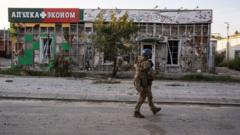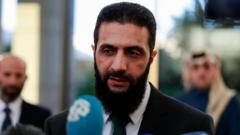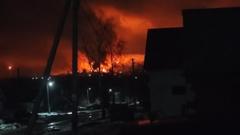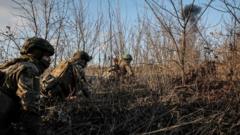Kaja Kallas, the European Union's foreign policy chief, asserts that rising defence budgets are essential for safeguarding Europe against threats, particularly in light of the ongoing war in Ukraine.**
EU Foreign Policy Chief Urges Increased Defence Spending Amid Ongoing Threats**

EU Foreign Policy Chief Urges Increased Defence Spending Amid Ongoing Threats**
Kaja Kallas emphasizes the necessity for EU member states to enhance military expenditures to counter security risks and maintain stability within the bloc.**
The European Union's foreign policy chief, Kaja Kallas, has delivered a potent warning to member states regarding the urgent need to ramp up defence spending as the continent confronts increasing security threats. In her recent remarks, Kallas, who previously served as Estonia's prime minister until July 2024, asserted that without adequate military investments, vital public sectors such as education, healthcare, and welfare become dangerously vulnerable.
Emphasizing the disparity in defence expenditures, Kallas referenced the United States' prior critiques of Europe's financial commitment to military spending, which currently averages around 1.9% of GDP. In comparison, she noted that Russia allocates a striking 9% of its GDP to military funding, highlighting that Europe’s current expenditure is insufficient, especially in the context of the ongoing war in Ukraine. "To prevent the war, we need to spend more, that is clear," she stated during an interview on the BBC World Service's Weekend programme.
The EU foreign policy chief called for a unified approach among member states to exert economic pressure on Russia, indicating the likelihood of a new sanctions package in the coming month to commemorate the three-year mark of the Ukrainian conflict. Kallas stressed the need for creative strategies to hinder Russia's capacity to continue the war and insisted that pressuring Russian President Vladimir Putin is crucial to achieving peace, given that he initiated the conflict.
Before taking on her pivotal EU role last December, Kallas consistently advocated for heightened defence budgets while leading Estonia as its first female prime minister. She previously urged NATO allies to aim for a budget of 3% of GDP for defence. Since the annexation of Crimea in 2014, NATO members have agreed to ensure a minimum defence spending of 2% of GDP due to escalating threats from Russia.
Under Kallas's leadership, Estonia has exceeded this baseline, pledging substantial support to Ukraine's military efforts. Last year, she highlighted that if all NATO nations matched Estonia's contributions, Ukraine's position in the war would significantly improve.
As NATO gears up for 2024, Kallas is aligned with Secretary-General Mark Rutte's assertion that member states must embrace a "wartime mindset," shifting focus to even higher defence expenditures. Historical pressures from leaders like former U.S. President Donald Trump, who called for NATO allies to meet spending commitments of 4% or even 5%, resonate as Europe contemplates its military future.
Kallas remained optimistic about the possibility of a victorious outcome for Ukraine, stating, "I don't see any other option really. If we let the brutal aggression flourish, then we will see this in other parts of the world." She concluded by observing that the response to Russia's actions is being closely monitored by potential aggressors worldwide, reiterating the importance of a robust and united European defence posture.





















